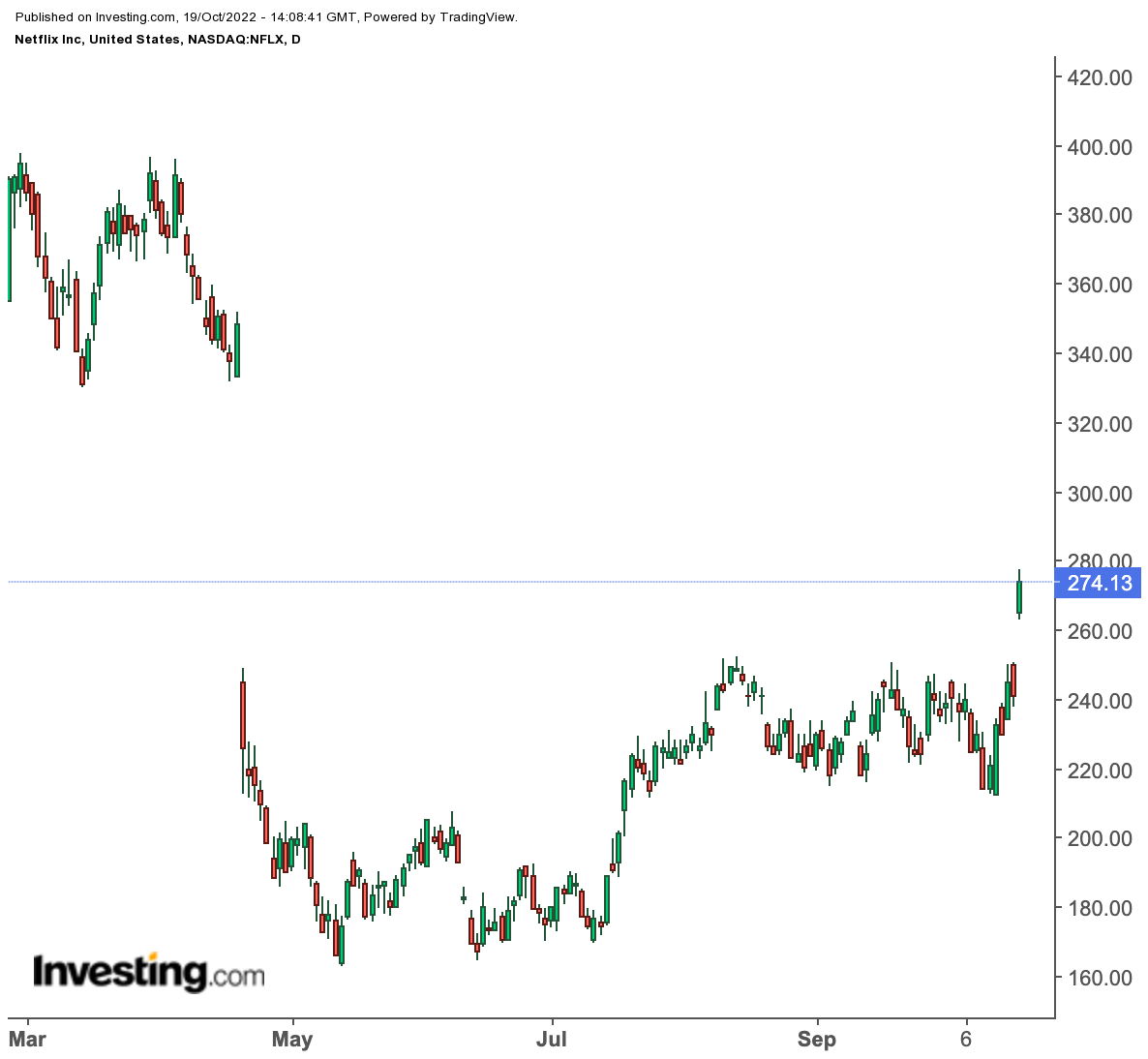- Groupthink is a psychological phenomenon that occurs within a group of people and leads to irrational or dysfunctional decision-making
- Those who bought NFLX last year are still far from recovering their premium
- Likewise, those shunning the stock this year may have just missed an opportunity
Netflix (NASDAQ:NFLX) released Q3 results yesterday, with earnings per share of $3.10, $0.92 higher than analysts' estimates of $2.18. Revenue for the quarter came in at $7.93 billion compared to consensus estimates of $7.85 billion, up 6% year-on-year. The decline in revenues over the previous quarter was attributed to foreign exchange headwinds.
Despite unimpressive forward guidance for the rest of the year, the stock opened Wednesday's session nearly 14% higher on the report, indicating that investors may be bullish again on the video streaming giant.

Now let's go back to the first negative earnings of 2022, in late January, followed by a second, similarly negative, which led to an overall decline of more than 53% for the stock.
At the time, one of the world's top investors, Bill Ackman, entered Netflix for a huge profit after the first earnings miss. But that was only to correct himself and sell all his positions in the video streaming company after NFLX's second straight earnings miss, claiming he did not see any prospects on the stock. The trade, which had been highly profitable until April, was closed with a $400 million loss.
From that moment on, a media campaign started among investors where companies such as Netflix, Meta Platforms (NASDAQ:META), Amazon.com (NASDAQ:AMZN), etc., seemed to have lost their appeal entirely. What was once an outstanding stock had suddenly been labeled junk and something to be utterly avoided.
However, what the superficial media did not point out is that, unlike us, Bill Ackman cannot afford to close poorly in a 12-month timeframe or underperform the market; otherwise, his investors will take the residual money and move it elsewhere.
Since we are not Bill Ackman, the two questions we need to ask ourselves are:
- Is Netflix really worth today what it was worth in 2018?
- And, in general, how should we make sense of current tech valuations?
I don't like to say, "I said so," but I invite you to review my analysis to that same effect of April 21, just after the second dismal report and Bill's exit, which you can find at this link (in Italian only). I had started accumulating the stock, closing it (positively) in the summer after better-than-expected earnings.
Today it is expected (it is part of mass psychology) for everyone to start badmouthing profitable companies just for the convenience of saying, "I told you so."
The point is I agree on one thing: in November last year, all these stocks were expensive. At that time, buying did not make sense. Thus, for those who bought stocks on the highs... it's a problem.
It's a problem because 50%-60% drops take a long time to recover, and you need significant percentages to get there (see above).
However, in the end, we have to say that even in the Nifty-Fifty crash of 1973, if one had taken the motto of buy and hold forever to the letter, they would be a millionaire in 8 out of 10 stocks. Not only that, but those who had bought stocks after -40% or -50% declines would have had a much shorter recovery time (a few months to 2-3 years maximum).
Today, however, it is likely that more buying opportunities will appear for those with enough patience. Again, a case-by-case basis remains important, but overall, companies still growing and making profits should thrive in the long term.
Unlike Bill, the point is that we don't have to make money within 12 months, or investors will move their funds elsewhere. We have TIME, and time when investing is a precious resource.
That goes to show, once again, that following the masses is dangerous, but then I also want to say, isn't it nicer and more satisfying to think for oneself and try to go deeper where everyone reads the headline?
Netflix may have other moments of difficulty in the future, but from that to labeling it as garbage, it is a long way off.
Disclosure: The author currently doesn't hold any Netflix shares. He sold his stake in August for a 12.25% gain.
